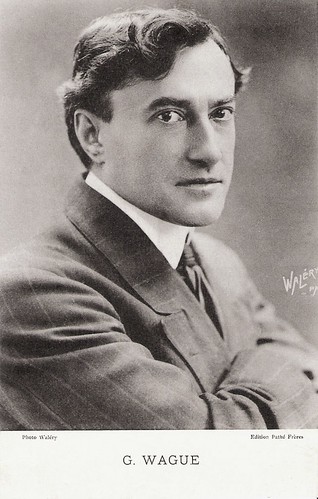
French postcard by Edition Pathé Frères. Photo: Waléry, Paris.
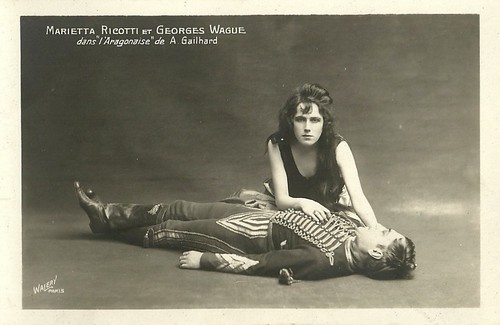
French postcard by R. Guilleminot, Boespflug & Co., Paris. Caption: Georges Wague, Professeur du Conservatoire de Paris, in Christophe Colomb. The silent film Christophe Colomb/La vida de Cristóbal Colón y su descubrimiento de América (Gérard Bourgeois, 1916) was a Franco-Spanish coproduction by Argos P.C and Films Cinematographiques, while the script was by Charles Jean Drossner.

British postcard by K Ltd.
Cantomime
Georges Wague was born Georges Marie Valentin Waag in Paris in 1874.
In the early 1890s, Wague participated in the soirées of La Plume, the literary magazine founded by Léon Deschamps, where he was noticed for his verse recitals. Xavier Privas proposed to sing songs while Georges Wague mimed them, creating a new artistic expression they called 'cantomime'.
In the cantomimes, which began in 1893 at the Café Procope, Wague performed on stage with a singer and piano in the wings. Often the character was Pierrot. The established mime Félicia Mallet assisted Wague in developing his highly individual style during the early part of his career. Cantomimes included Noël de Pierrot (1894) and Le Testament de Pierrot (1895).
Wague staged his first pantomime at the Théâtre Montparnasse in 1895, Le Voeu de Musette. Many others followed over the years. To revive his career after his return from military service in 1898, Georges Wague began to participate in soirées of the 'Veillées artistiques de Plaisance'. Cantomimes included Pierrot Chante (1899) and Sommeil Blanc (1899). Sommeil blanc (White Sleep) was written for him by Xavier Privas, with music by Louis Huvey.
Due to rivalry with other performers of cantomimes, Wague created a company with Christiane Mandelys (or Mendelys), who became his wife, to preserve his rights as the inventor of the concept. With his troupe, he played La Roulotte (The Caravan) directed by Georges Chartron. He won success and began touring in France and abroad, leading to a presentation of the last show at the Exposition Universelle (1900) where he played Pierrot parts such as unfaithful Pierrot and Christmas Pierrot.
Georges Wague decided to move into white pantomime, where large gestures and movements are made, and the pantomime is dramatic. For this, he changed his stage play: his mime consisted of gestures reduced to the simplest attitudes to express the full range of thought in constant movement. He did not use the conventional alphabet of mimes in this original form of expression.
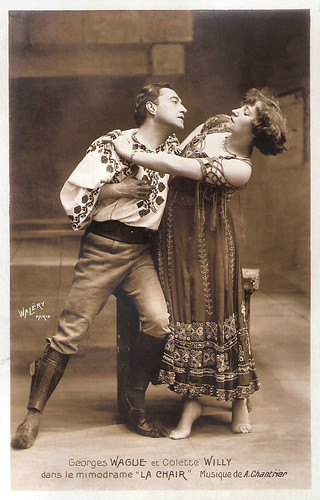
French postcard. Photo: Waléry, Paris. Publicity still for the mime drama La Chair/The Flesh (1907) with Colette. The drama was written by Georges Wague and Leon Lambert, with music by Albert Chantrier.
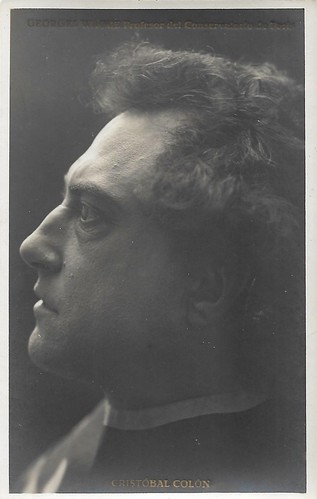
French postcard by R. Guilleminot, Boespflug & Co., Paris. Caption: Georges Wague, Professeur du Conservatoire de Paris, in Christophe Colomb. The silent film Christophe Colomb/La vida de Cristóbal Colón y su descubrimiento de América (Gérard Bourgeois, 1916) was a Franco-Spanish coproduction by Argos P.C and Films Cinematographiques, while the script was by Charles Jean Drossner.
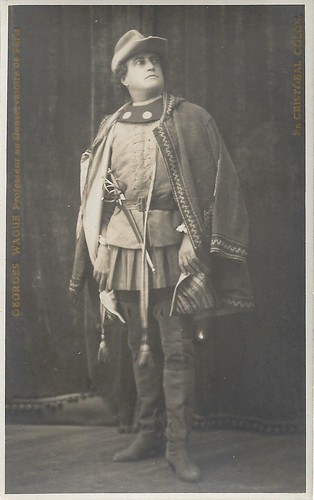
French postcard by R. Guilleminot, Boespflug & Co., Paris. Caption: Georges Wague, Professeur du Conservatoire de Paris, in Christophe Colomb. The silent film Christophe Colomb/La vida de Cristóbal Colón y su descubrimiento de América (Gérard Bourgeois, 1916) was a Franco-Spanish coproduction by Argos P.C and Films Cinematographiques, while the script was by Charles Jean Drossner.
More than forty films
Georges Wague taught pantomime, notably to the writer Colette, with whom he made a tour from 1906 to 1912 and caused a scandal with presentations of La Chair (Flesh) where Colette was largely naked. Wague performed in many stage pantomimes including Scaramouche, Barbe Bluette and L'homme aux poupées, and played silent roles in ballet and opera.
Between 1907 and 1922 he also performed in more than forty films. He started his film career with the silent film L'Enfant prodigue/The Prodigal Son (Michel Carré, 1907), where he played a Pierrot. His last film performance was in Faust (Gérard Bourgeois, 1922).
He continued to play a white-faced Pierrot at the Opéra-Comique during the 1920s. In 1925 he performed with the flamenco dancer Antonia Mercé y Luque, 'La Argentina', in El amor brujo at the Théâtre Trianon-Lyrique. From 1916 Wague taught at the Conservatoire national supérieur d'art dramatique. Wague taught mimes who went on to great fame such as Christine Kerf, Caroline Otéro, Angèle Héraud and Charlotte Wiehé.
He also taught actors and opera singers how to use their bodies to express their feelings. This skill was much neglected in opera, where often the singers were chosen for their voice rather than their appearance and had only little acting ability. Wague collaborated with the mime and actor Jean-Louis Barrault when he played Jean-Gaspard Deburau in the film Les Enfants du Paradis/Children of Paradise (Marcel Carné, 1943), the basis for his 1946 mime piece Baptiste.
Georges Wague was awarded the Grande médaille de vermeil by the city of Paris in 1962. In 1965, he died in Menton in the Alpes-Maritimes, aged 91.

French postcard by R. Guilleminot, Boespflug & Co., Paris. Caption: Georges Wague, Professeur du Conservatoire de Paris, in Christophe Colomb. The silent film Christophe Colomb/La vida de Cristóbal Colón y su descubrimiento de América (Gérard Bourgeois, 1916) was a Franco-Spanish coproduction by Argos P.C and Films Cinematographiques, while the script was by Charles Jean Drossner.

French postcard in the Etoiles et Beautés Series by Editions artistiques de Waléry, Paris. Photo: Waléry, Paris. Caption: Georges Wague, Professeur du Conservatoire de Paris, in Christophe Colomb. The silent film Christophe Colomb/La vida de Cristóbal Colón y su descubrimiento de América (Gérard Bourgeois, 1916) was a Franco-Spanish coproduction by Argos P.C and Films Cinematographiques, while the script was by Charles Jean Drossner. A poor B & W print of the entire film can be seen on YouTube. Yet, our cards may perhaps also refer to a stage version.
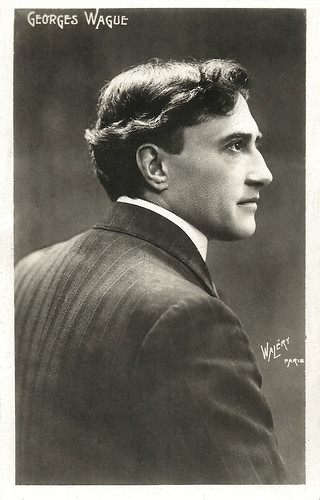
French postcard. Photo: Waléry, Paris.
Sources: Wikipedia and IMDb.
No comments:
Post a Comment